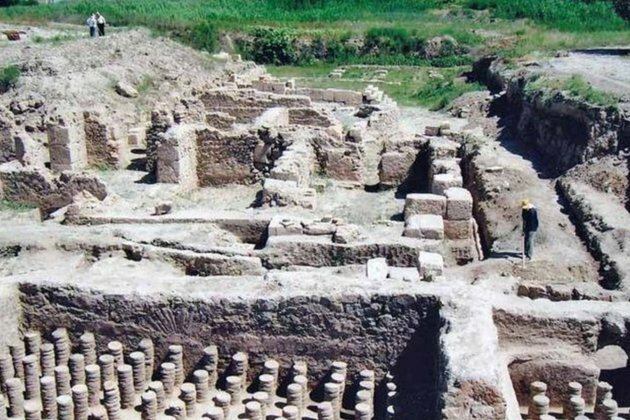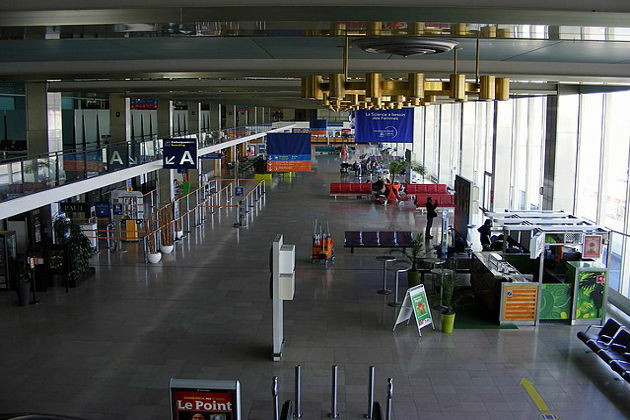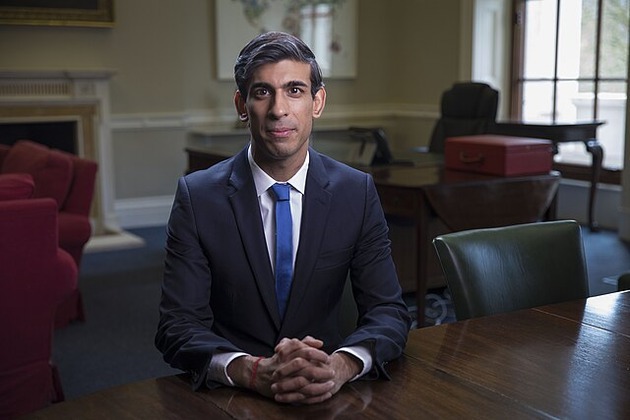Easternmost Roman Aqueduct Found Under An Armenian Melon Field
RFE
02 Dec 2021, 23:45 GMT+10

After moving aside a jumble of ripening melons, Armenian and German researchers uncovered a thrilling find with their shovels in the summer of 2019: Just 30 centimeters below the surface of the Ararat plain lay a massive slab of Roman concrete.
Members of the Armenian-German Artaxata project digging in the summer of 2019.
The block is believed to be one of hundreds of foundation stones from an unfinished Roman aqueduct intended to funnel water to the ancient city of Artaxata. Although the original source of the water for the aqueduct is not known with certainty, its length is calculated to have been around 31 kilometers and may have begun near the Temple of Garni.
Bathhouses uncovered in the ancient Armenian city of Artaxata. The archaeological site has been researched intermittently since the 1970s.
Rome controlled the former Armenian capital of Artaxata, located around the hills where the Khor Virap monastery is located today, for just three years before retreating west in the face of a local uprising in 117. The aqueduct's construction was abandoned and all trace of it eventually disappeared beneath centuries of shifting soil and dust.
Slabs of Roman-era concrete that were intended to serve as a foundation for an arched aqueduct.
The results of the 2019 dig were published in November as a joint project between the Armenian Academy Of Science and the University of Munster. Achim Lichtenberger and Torben Schreiber, who authored the report with Mkrtich Zardarian, told RFE/RL that the first clue about the Roman Empire's easternmost aqueduct came in 2018.
Using magnetic surveying equipment, researchers that year spotted a mysterious underground line that led directly to one of the hills where the ancient city stood.
Some of the team working on finds in their "base camp" near the archaeological site of Artaxata.
The archaeologists gathered together that evening to study the geomagnetic survey results in a house where they were based.
"It was an amazing moment when we were looking at the raw data from the survey and thinking, 'What could this be?' Lichtenberger says. "We were considering everything from a Soviet water channel to an aqueduct."
A van loaded with equipment needed for the 2019 dig. In the background is Mount Ararat and the Khor Virap monastery.
A year later, the team was able to reunite and, with the blessing of the farmer who owned the land, dug up the remarkable find. But the researchers say that anyone hoping to lay hands on the freshly discovered Roman concrete will be disappointed.
The team uncovering the aqueduct base in the summer of 2019.
"You won't see the remains of this aqueduct" Lichtenberger says. "After our excavation, we backfilled everything.
'We do this because it's the best way to protect the ancient ruin from the weather and everything, and it means the farmers can use their land again within a year."
The Armenian-German Artaxata project team photographed during the 2019 dig.
The German researchers say the excavation, which involved living and working alongside Armenian colleagues and German students, was one of their most memorable assignments.
"When you have a campaign like this that lasts for six weeks, it really becomes like family," Schreiber recalls. "It was a very friendly dig."
Copyright (c) 2018. RFE/RL, Inc. Republished with the permission of Radio Free Europe/Radio Liberty, Washington DC 20036
 Share
Share
 Tweet
Tweet
 Share
Share
 Flip
Flip
 Email
Email
Watch latest videos
Subscribe and Follow
Get a daily dose of Colorado Star news through our daily email, its complimentary and keeps you fully up to date with world and business news as well.
News RELEASES
Publish news of your business, community or sports group, personnel appointments, major event and more by submitting a news release to Colorado Star.
More InformationInternational Business
SectionPwC: Copper shortages may disrupt 32 percent of chip output by 2035
AMSTERDAM, Netherlands: Some 32 percent of global semiconductor production could face climate change-related copper supply disruptions...
Ireland’s PM ‘hopeful’ of EU-US tariff deal before July 9 deadline
DUBLIN, Ireland: Taoiseach Micheál Martin has expressed cautious optimism that the European Union and the United States can strike...
FedEx, UPS step up as Canada Post loses market share in strikes
OTTAWA, Canada: With Canada Post struggling to maintain operations amid labour unrest, rivals like FedEx and UPS are stepping in to...
Beijing blamed for covert disinformation on French fighter jet Rafale
PARIS, France: French military and intelligence officials have accused China of orchestrating a covert campaign to damage the reputation...
Beijing hits back at EU with medical device import curbs
HONG KONG: China has fired back at the European Union in an escalating trade dispute by imposing new restrictions on medical device...
Summer travel in chaos as French air traffic controllers walk off job
PARIS, France: A strike by French air traffic controllers demanding improved working conditions caused significant disruptions during...
US
SectionAI saves $500 million for Microsoft as layoffs reshape strategy
REDMOND, Washington: Artificial intelligence is transforming Microsoft's bottom line. The company saved over US$500 million last year...
CDC: US records 1,288 measles cases, most since 1992 outbreak
ATLANTA, Georgia: The United States is facing its worst measles outbreak in more than three decades, with 1,288 confirmed cases so...
FTC’s rule to ease subscription cancellations struck down by court
WASHINGTON, D.C.: A federal rule designed to make it easier for Americans to cancel subscriptions has been blocked by a U.S. appeals...
Ex-UK PM Sunak takes advisory role at Goldman Sachs
NEW YORK CITY, New York: Former British prime minister Rishi Sunak will return to Goldman Sachs in an advisory role, the Wall Street...
Travelers can now keep shoes on at TSA checkpoints
WASHINGTON, D.C.: Travelers at U.S. airports will no longer need to remove their shoes during security screenings, Department of Homeland...
Gold ETF inflows hit 5-year high as tariffs drive safe-haven bets
LONDON, U.K.: Physically backed gold exchange-traded funds recorded their most significant semi-annual inflow since the first half...













